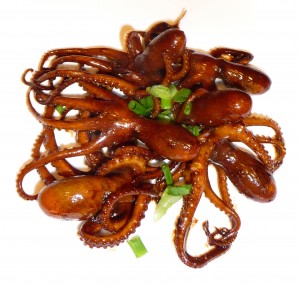Science vs. Gastronomy
I was just looking through one of my notebooks, and found a rather endearing story. It was in Ningbo, at the end of a fabulous dinner that had involved, among other things, divine little octopi (served whole), crunchy jellyfish, salted raw crab, white shrimps and red-braised pork with sea moss, and the chef was telling us all about a culinary conference he’d attended in a nearby city. ‘You know, everyone at the conference agreed [he sighed as he said this] that Western science was very advanced and developed, but that Western food didn’t amount to much. Whereas China might not have such advanced science, but the Chinese had really moved their brains åŠ¨äº†è„‘ç‹ when it came to food.’
It’s not the first time I’ve heard Chinese people blaming gastronomy for their country’s decline in the nineteenth and twentieth centuries*, but I loved the way he expressed it!
*In my ‘Shark’s Fin’ book I think I mentioned the Xi’an taxi driver who picked me up from the Banpo Neolithic village, and who moaned on the way back into town about the fact that the Chinese had invented steaming in the Stone Age, but had only applied it to cooking, leaving it to the British, many centuries later, to invent the steam engine.


4 Responses to “Science vs. Gastronomy”
Ha ha ha! Can’t understand why anybody would make that correlation. I would have to say that here in the East, there seems to be much more fondness toward food. Having said that, I’m definitely sure the French, Italians and some other European countries would hardily disagree! They are quite passionate about their spectacular food! I sincerely hope that the Chinese don’t believe that McDonalds is the extent of western food!
Sadly, in my experience, the only Western food most Chinese people have tasted IS McDonalds and KFC, and so that is what shapes their opinions about Western food.
Not very different from Western opinions about Chinese food, however – because until recently most Brits, at any rate, thought Chinese food didn’t amount to much more than sweet-and-sour pork balls and egg-fried rice. Thankfully this is changing, thanks to the growing popularity of dim sum and Sichuanese food (in London and some other cities at least), and to the growing popularity of China as a business and holiday destination.
I wish the same would happen in America. Sure, there are enclaves where people can venture into new territory and taste “strange” foods, but that is definitely not the norm. The fact that less than 50% of Americans even have a passport, let alone use one, means that public ideas about any foreign cuisine will not be changing any time soon. Here in Japan I’ve had Chinese food that I had never even heard of back home. Of course, there is no Sichuan cuisine available here. Japanese people do not like spicy food, so they’re afraid of it, with the exception of Mabo Dofu. They do like Sichuan pepper.
During a long distance bike trip, I found myself in a small town in rural Indiana which had no restaurants. Unable to face a gas station hot dog, I asked the locals if any towns nearby boasted a diner or cafe. They all suggested a 6 mile jaunt to the interstate off-ramp which had a McDonalds. One, a bit more worldly than the others, observed that as a cyclist I might want to try the new health food restaurant that had newly opened 15 miles away.
It was a Subways.
He was not being sarcastic.
Ah, the provincial mindset. In our own culture, it causes us to despair. In foreign nations, it is quaint traditionalism.